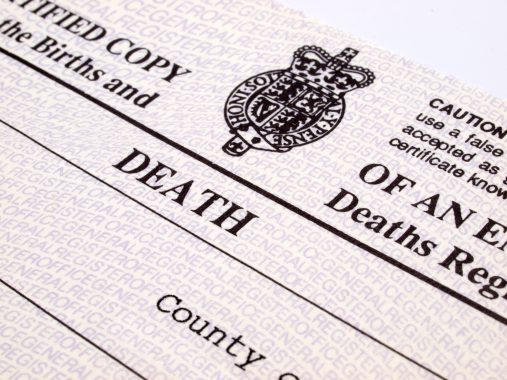The Coronavirus Act, which was passed by Parliament yesterday and is law as of today, means it is now possible for GPs to certify death without physically attending.
The emergency laws are designed to consider the coronavirus restrictions on in-person interactions and that death may occur in households that are self-isolating, making it difficult for GPs to attend in person.
The new Act, which extends to over 300 pages, covers law changes for the healthcare system, including emergency registration of health professionals; health service indemnification; NHS and local authority care and support; and includes new information about the registration of deaths.
Explanatory notes on the Act from the Government say: ‘In England and Wales, the Births and Deaths Registration Act 1953 places a responsibility on the deceased’s doctor to provide a medical certificate giving, to the best of the doctor’s knowledge and belief the cause of death.
‘This medical certificate is given to the registrar and used to record the cause of death in the death registration. If the doctor is not able to sign the medical certificate, for whatever reason, the death has to be referred to the coroner for investigation. The Bill will simplify this and provide more flexibility in an emergency situation by enabling a doctor who may not have seen the deceased to certify the cause of death without the death being referred to the coroner.’
The notes added: ‘These provisions aim to provide flexibility in respect of health provisions during a pandemic, and mitigate the spread of infection. Provisions will also be made for the necessary documentation relating to death registration to be transmitted by alternative methods, including electronically.’
And the Government said the Act ‘will make similar changes to the relevant legislation relating to England and Wales, Scotland and Northern Ireland to streamline processes’.
Additional changes to death certification process include:
- A coroner is only to be notified where a doctor believes there is no medical practitioner who may sign the death certificate, or that they are not available within a reasonable time of the death.
- The list of people who can register a death has expanded and now includes funeral directors.
- Documents to certify the death can now be presented electronically rather than in person.
- There is now no need for a second confirmatory medical certificate for a cremation to take place.
The changes apply to all deaths, not just Covid-19 related deaths, but come in response to an expected increase in deaths related to the virus.
Chief scientific adviser Patrick Vallance has said that 20,000 deaths or fewer would be a ‘good outcome’ of the coronavirus outbreak, admitting that the likely death toll is much higher.
In an extreme situation, where the death rates from Covid-19 might exceed local capacity to manage the deaths, the Coronavirus Acts gives local government the power to streamline the death management process.
The Government act formalises advice from NHS England about certifying death in the wake of the Covid-19 crisis.
It modifies, temporarily, the Notification of Death Regulations 2019 regulations, which came into effect in October last year.
Note: This article was updated at 10.30 on 27 March to include explanatory notes from the Government.
Pulse October survey
Take our July 2025 survey to potentially win £1.000 worth of tokens














